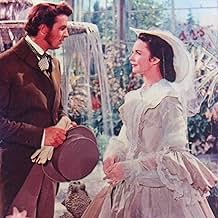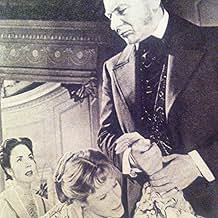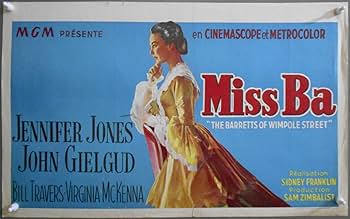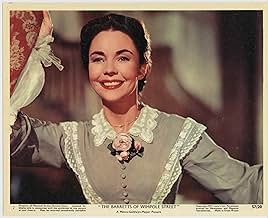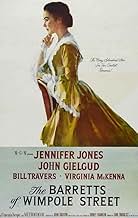Ajouter une intrigue dans votre langueElizabeth Barrett's tyrannical father has forbidden any of his family to marry. Nevertheless, Elizabeth falls in love with the poet Robert Browning.Elizabeth Barrett's tyrannical father has forbidden any of his family to marry. Nevertheless, Elizabeth falls in love with the poet Robert Browning.Elizabeth Barrett's tyrannical father has forbidden any of his family to marry. Nevertheless, Elizabeth falls in love with the poet Robert Browning.
Christopher Cooke
- Minor Role
- (uncredited)
Histoire
Le saviez-vous
- AnecdotesOne of the last CinemaScope movies released in the wider aspect ratio of 2.55:1. Beginning later that year, the aspect ratio of CinemaScope movies was changed to 2.35:1, because of the optional mono soundtrack now printed on the film, in addition to the four stereo ones. This mono soundtrack was added to most movies recorded in stereo because not all theaters were willing to convert their sound systems.
- GaffesThe London pillar boxes weren't painted red (as seen) until 1874; before that, they were green.
- ConnexionsReferenced in Wogan: Episode #10.35 (1990)
- Bandes originalesWilt Thou Have My Hand
Music by Herbert Stothart
[Elizabeth and all her siblings sing the song in her bedroom as she plays the piano; theme heard in the score throughout the movie]
Commentaire en vedette
Throughout this film, I kept thinking of Director Wm. Wyler's adaptation of Henry James's novel, with Olivia de Havilland in "The Heiress." What made that a better movie? was it the casting? the directing? the actor chemistry? or all of the above? Previous reviewers of "Barretts" all praised Gielgud's acting, but I wondered why he accepted the role, or could stand himself in it. I could barely view him on screen, so wooden, so inhuman was his incarnation of Moulton Barrett: this was not a person, it was a caricature. Compare, instead, Ralph Richardson's interpretation of a similar emotion-starved and pathologically driven father in his love for his daughter.
As for the casting of Bill Travers as Robert Browning, I felt he lacked any subtlety, any "poetry" in his manner, any semblance of an understanding of female psychology or charm, most of all, lacked any chemistry with Jones as Elizabeth. He seemed to be barking all of his lines as if he were on the football field. Can you imagine his role cast instead with, say David Farrar, or one of the Ealing Studio regulars? Fans of Jennifer Jones may still want to sit through this movie to see her conception of the poetess. But when we compare this role with her performance in, say, "Wild at Heart [Driven to Earth]," the great Powell-Pressburger film, or even "Madame Bovary," it falls far short of full realization. In those films, she revealed passion, coyness, charm and geniune fear, gripping us with the emotions of her predicament. As noted by another reviewer, here she appears far too healthy, even too mature (although that would be an accurate estimation of her actual age when she met Browning, according to her biography) to be believable. Of course we can accept some cinematic license -- we don't have to expect that Mimi should actually be consumptive in "La Boheme"--but Jones's conception confused strength of character with bodily health -- her fainting on the stairs was almost a joke, more a sign of her rare weakness as an actress. In fact, one actually felt more pity for her sister, as portrayed by Virginia McKenna, in a lively,deeply felt role, in which we feared for Henrietta's emotional health and future in that stifling household.
So, shall we lay the blame at the foot of the hapless director Sidney Franklin? All the settings, the costumes, even the lovely tune, beautifully sung by Jones at the piano should have offered the right support. The clumsiness of the production is almost encapsulated in that little scene around the piano: when Jennifer sings it (whether or not she herself indeed voiced it), there is lyricism and musicality, and one longs for her to continue, but everyone, namely her brothers, is urged to join in. None of them can really sing, they shout out the melody, drowning Elizabeth's soprano, and the whole scene, at least for this viewer, is ruined. Just like the movie.
Of a possible four ****, I give it my lowest rating one star*.
As for the casting of Bill Travers as Robert Browning, I felt he lacked any subtlety, any "poetry" in his manner, any semblance of an understanding of female psychology or charm, most of all, lacked any chemistry with Jones as Elizabeth. He seemed to be barking all of his lines as if he were on the football field. Can you imagine his role cast instead with, say David Farrar, or one of the Ealing Studio regulars? Fans of Jennifer Jones may still want to sit through this movie to see her conception of the poetess. But when we compare this role with her performance in, say, "Wild at Heart [Driven to Earth]," the great Powell-Pressburger film, or even "Madame Bovary," it falls far short of full realization. In those films, she revealed passion, coyness, charm and geniune fear, gripping us with the emotions of her predicament. As noted by another reviewer, here she appears far too healthy, even too mature (although that would be an accurate estimation of her actual age when she met Browning, according to her biography) to be believable. Of course we can accept some cinematic license -- we don't have to expect that Mimi should actually be consumptive in "La Boheme"--but Jones's conception confused strength of character with bodily health -- her fainting on the stairs was almost a joke, more a sign of her rare weakness as an actress. In fact, one actually felt more pity for her sister, as portrayed by Virginia McKenna, in a lively,deeply felt role, in which we feared for Henrietta's emotional health and future in that stifling household.
So, shall we lay the blame at the foot of the hapless director Sidney Franklin? All the settings, the costumes, even the lovely tune, beautifully sung by Jones at the piano should have offered the right support. The clumsiness of the production is almost encapsulated in that little scene around the piano: when Jennifer sings it (whether or not she herself indeed voiced it), there is lyricism and musicality, and one longs for her to continue, but everyone, namely her brothers, is urged to join in. None of them can really sing, they shout out the melody, drowning Elizabeth's soprano, and the whole scene, at least for this viewer, is ruined. Just like the movie.
Of a possible four ****, I give it my lowest rating one star*.
- gleywong
- 7 déc. 2003
- Lien permanent
Meilleurs choix
Connectez-vous pour évaluer et surveiller les recommandations personnalisées
Détails
- Durée1 heure 45 minutes
- Rapport de forme
- 2.55 : 1
Contribuer à cette page
Suggérer une modification ou ajouter du contenu manquant

Lacune principale
By what name was The Barretts of Wimpole Street (1957) officially released in India in English?
Répondre



